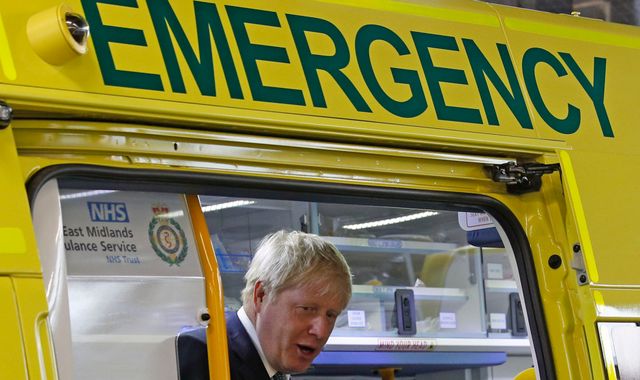NHS artificial intelligence boost to tackle cancer and dementia
Written by News on 08/08/2019
A new £250m investment in “robot” technology to treat cancer, dementia and heart disease in the NHS is being promised by Boris Johnson in his latest pledge on health spending.


The government says the aim is to make the NHS a world leader in artificial intelligence – digital computers or computer-controlled robots that perform tasks normally undertaken by humans – and health research.
Up to five million people will also receive a free personalised health report based on their DNA, in a move that is part of a health spending “blitz” championed by Mr Johnson’s controversial adviser Dominic Cummings.
The Prime Minister has already announced £1.8bn for 20 hospital upgrades this week, as he attempts to deliver on the controversial “£350m a week for the NHS” slogan on his 2016 EU referendum battle bus.
The latest NHS pledge also comes 24 hours after the Government pledged to overhaul pension tax rules that have created a staffing crisis resulting in longer waiting lists, backlogs for operations and delays in cancer treatment.
And the promise to use advanced technology to identify patients at risk of dementia comes in a week when Dame Barbara Windsor, who has Alzheimer’s, called on the PM to “sort out” the UK’s dementia care crisis.
Announcing the spending boost for new treatments, Mr Johnson said: “The NHS is revered for the world-class care it provides every day – a treasured institution that showcases the very best of Britain.
“But it is also leading the way in harnessing new technology to treat and prevent, from earlier cancer detection to spotting the deadly signs of dementia.
“Today’s funding is not just about the future of care though. It will also boost the front line by automating admin tasks and freeing up staff to care for patients.
“My task to ensure the NHS has the funding it needs to make a real difference to the lives of staff and patients. Transforming care through artificial intelligence is a perfect illustration of that.”
Health Secretary Matt Hancock, a George Osborne protégé but now a Johnson ally, said: “We are on the cusp of a huge health tech revolution that could transform patient experience by making the NHS a truly predictive, preventive and personalised health and care service.
“I am determined to bring the benefits of technology to patients and staff, so the impact of our NHS Long Term Plan and this immediate, multi-million pound cash injection are felt by all. It’s part of our mission to make the NHS the best it can be.
“The experts tell us that because of our NHS and our tech talent, the UK could be the world leader in these advances in healthcare, so I’m determined to give the NHS the chance to be the world leader in saving lives through artificial intelligence and genomics.”
NHS England chief executive Simon Stevens, who was this week revealed to have “bonded” with Mr Johnson when they were students at Oxford University more than 30 years ago, added: “Carefully targeted AI is now ready for practical application in health services,
“And the investment announced today is another step in the right direction to help the NHS become a world leader in using these important technologies.
“In the first instance it should help personalise NHS screening and treatments for cancer, eye disease and a range of other conditions, as well as freeing up staff time, and our new NHS AI Lab will ensure the benefits of NHS data and innovation are fully harnessed for patients in this country.”
:: Listen to the Daily podcast on Apple Podcasts, Google Podcasts, Spotify, Spreaker
The Department of Health says artificial intelligence is already being developed in some hospitals, including Imperial College London, predicting survival rates for ovarian cancer, and University College Hospital, predicting missed appointments and allowing staff to follow up with targeted phone calls, saving £2-3 per appointment.
Mr Hancock is announcing plans to invest in a National Artificial Intelligence Lab. The aim is that patients should benefit from beds being freed up and from treatment closer to home, as well as new treatments for deadly diseases, as the lab works to improve health and care using the UK’s best technology.
According to the Department of Health, the AI Lab could:
• Improve cancer screening by speeding up the results of tests, including mammograms, brain scans, eye scans and heart monitoring, helping to save millions of lives a year.
• Use predictive models to better estimate future needs of beds, drugs, devices, or surgeries.
• Identify which patients could be more easily treated in the community, reducing the pressure on the NHS and helping patients receive treatment closer to home.
• Identify patients most at risk of diseases such as heart disease or dementia, allowing for earlier diagnosis and cheaper, more focused, personalised prevention.
• Build systems to detect people at risk of post-operative complications, infections or requiring follow-up from clinicians, improving patient safety and reducing readmission rates.
• Upskill the NHS workforce so they can use AI systems for day-to-day tasks
• Inspect algorithms already used by the NHS to increase the standards of AI safety, making systems fairer, more robust and ensuring patient confidentiality is protected
• Automate routine admin tasks to free up clinicians so more time can be spent with patients.
The Government claims the £250m for health technology is in addition to the £1.8bn hospital upgrades and infrastructure projects and the proposals to fix doctor’s pensions so clinicians can take on extra shifts and cut waiting times.
(c) Sky News 2019: NHS artificial intelligence boost to tackle cancer and dementia







